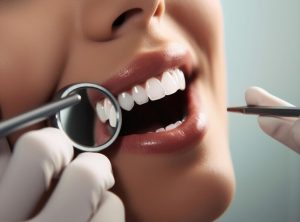Implant Dentistry in Pasadena
Reach us today for high-quality Implant Dentistry in Pasadena, and restore your smile with expert care and precision. Get in touch today for top-notch Implant Dentistry in Pasadena, and achieve a permanent solution for missing teeth with expert care.
At Lonestar Family Dental, our standard of care for replacing missing teeth is implant dentistry in Pasadena. The goal of changing teeth is to restore tooth function and aesthetics. Dental Implants are a great way to restore a good smile by replacing missing teeth.
A dental implant is a surgical procedure performed on the jaw that allows it to come into contact with the bone within 3 to 6 months. Dental implants act as root replacements for missing teeth. They are made of titanium, which, because of its properties, is not rejected by the body.
We can use dental implants to stabilize a dental bridge or dental implants, as well as a complete set of dentures through our dental-based dental procedure, method “All in 4”. Despite advances in dental care, millions of Americans are losing teeth – mainly due to tooth decay, periodontal disease, or injury. For many years, the only treatments available to people with missing teeth were bridges and dentures. But, today, implant dentistry in Pasadena TX 77504 is available so request an appointment now!
 The benefits of Implant dentistry in Pasadena TX 77504
The benefits of Implant dentistry in Pasadena TX 77504
Dental implants are surgically placed in your jawbone, where they serve as the roots of missing teeth. Because the titanium in the implants fuses with your jawbone, the implants won’t slip, make noise, or cause bone damage the way fixed bridgework or dentures might. And the materials can’t decay like your own teeth that support regular bridgework can.
In general, dental implants may be right for you if you:
- Have one or more missing teeth
- Have a fully developed jaw
- Have enough bone to protect the plants or to connect the bones
- Have healthy oral tissues
- Do not have health conditions that will interfere with bone healing
- People who cannot or are not willing to wear dentures
- Want to improve your speech
- Are willing to commit several months to the process
- Don’t smoke tobacco
Types of Dental Implant available at Lonestar Family Dental Clinic
- Single Tooth Dental Implant
- Implant-Supported Bridge
- Implant-Supported Denture
Get in touch today for top-notch Implant Dentistry in Pasadena, TX 77504, and achieve a permanent solution for missing teeth with expert care.
Risks
As with any surgical procedure, dental surgery poses certain health risks. Problems are rare, however, and when they do occur they are usually minor and easily treated. Risks include:
- Infection in the implant site
- Damage or damage to surrounding structures, such as other teeth or blood vessels
- Emotional damage can cause pain, numbness, or tingling in your natural teeth, gums, lips, or chin.
- Sinus problems, when dental implants are placed in the upper jaw resulting in one of your sinus cavities
How to prepare yourself
The planning process for dental implants may involve a variety of specialists, including a specialist in oral, jaw, and facial surgery (oral and maxillofacial surgery), and a dentist who specializes in the treatment of dental structures, such as gums, and bones. (periodontist), dentist (prosthodontist), ear specialist, nasal and pharynx (ENT). Because dental implants require one or more surgical procedures, you should have a thorough examination to prepare for the procedure, which includes:
Complete dental examination- You may have X ray of teeth and 3D photographs taken, and have models made of your teeth and jaw.
Review your medical history- Tell your doctor about any medical conditions or any medications you are taking, including over-the-counter and over-the-counter medications and supplements. If you have any heart conditions or bone marrow transplants, your doctor may prescribe antibiotics before surgery to help prevent infection.
Treatment plan- Depending on your condition, this program considers factors such as how many teeth you need to replace and the condition of your jaw and remaining teeth.
Schedule your appointment today for expert Implant Dentistry in Pasadena, TX 77504, and experience personalized care for a restored, lasting smile.
To control pain, anesthesia options during surgery include local anesthesia, sedation, or general anesthesia. Talk to your dentist about what option is best for you. Your dentist will teach you about eating and drinking before surgery, depending on the type of anesthesia you have. If you have sedation or general anesthesia, arrange for someone to take you home after the operation and expect to rest for the rest of the day.
 What you can expect
What you can expect
Dental implant surgery is usually an outpatient surgery performed in stages, with healing time between procedures. The process of placing a dental implant involves multiple steps, including:
- Damaged tooth removal
- Jawbone preparation (grafting), when needed
- Dental implant placement
- Bone growth and healing
- Abutment placement
- Artificial tooth placement
The entire process can take many months from start to finish. Much of that time is devoted to healing and waiting for the growth of new bone in your jaw. Depending on your situation, the specific procedure done, or the materials used, certain steps can sometimes be combined.
Schedule your appointment today for expert Implant Dentistry in Pasadena, TX 77504, and experience personalized care for a restored, lasting smile. Contact us today for expert Implant Dentistry in Pasadena, TX 77504, and start your journey toward a healthier, more confident smile.
Choosing your new artificial teeth
Once your gums heal, you’ll have more impressions made of your mouth and remaining teeth. These impressions are used to make the crown — your realistic-looking artificial tooth. The crown can’t be placed until your jawbone is strong enough to support the use of the new tooth.
You and your dental specialist can choose artificial teeth that are removable, fixed, or a combination of both:
- This type is similar to a conventional removable denture and can be a partial or full denture. It contains artificial white teeth surrounded by pink plastic gum. It’s mounted on a metal frame that’s attached to the implant abutment, and it snaps securely into place. It can be easily removed for repair or daily cleaning.
- In this case, the artificial tooth is permanently extracted or cemented into an abutment for individual implants. You cannot remove a tooth for cleaning or at bedtime. Most of the time, each crown is attached to its dental implant. However, because the plants are incredibly strong, several teeth can be replaced with a single implant if they are joined together.
Contact us today for expert Implant Dentistry in Pasadena, TX 77504, and start your journey toward a healthier, more confident smile. Reach us today for Implant Dentistry in Pasadena TX 77504
After the procedure
Whether you have orthopedic surgery in one or more stages, you may experience general discomfort associated with any type of dental surgery, such as:
- Swelling of the gums and face
- Skin and gum damage
- Pain in the implant site
- Slight bleeding
- You may need pain medication or antibiotics after dental surgery. If swelling, discomfort, or other problems worsen in the days following surgery, consult your oral surgeon.
After each stage of surgery, you may need to eat a soft meal while the surgical site heals. Usually, your surgeon will use a solvent that dissolves on its own. If your stitches do not dissolve, your doctor removes them – Implant Dentistry in Pasadena TX 77504
Reach us today for high-quality Implant Dentistry in Pasadena, TX 77504, and restore your smile with expert care and precision.
Results
Many dental implants have been successful. Sometimes, though, the bone is not strong enough to hold the metal in place. Smoking, for example, may contribute to addiction and complications. If the bone fails to connect properly, the implant is removed, the bone is cleaned, and you can try the procedure again in about three months.
You can help your dental work – and the remaining natural teeth – last longer if you:
Get acquainted (gain, obtain) with present-day oral hygiene. Like your natural teeth, keep your teeth, artificial teeth, and gums clean. Specially designed brushes, such as a toothbrush that slides between teeth, can help clean the nooks and crannies around the teeth, gums, and metal poles.
See your dentist regularly. Schedule dental examinations to ensure the health and function of your implants and follow the advice of a dental hygienist. Reach us today for high-quality Implant Dentistry in Pasadena, TX 77504, and restore your smile with expert care and precision.
Avoid harmful practices. Do not chew solid objects, such as ice and hard candy that could break your crown – or your natural teeth. Avoid cigarettes that stain teeth and caffeine products. If you brush your teeth, get treatment for Implant Dentistry in Pasadena TX 77504.
